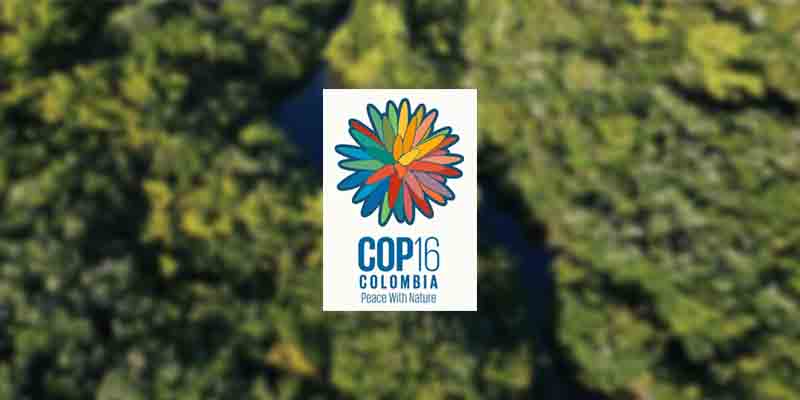- World
- Oct 21
Colombia’s Cali hosts COP16 on biodiversity
• The 16th meeting of the Conference of the Parties (COP16) to the Convention on Biological Diversity (CBD) will convene in Cali, Colombia from October 21 to November 1.
• Under the theme ‘Peace With Nature’, this will be the first Biodiversity COP since the adoption of the Kunming-Montreal Global Biodiversity Framework at COP 15 in December 2022 in Montreal, Canada.
• At COP 16, governments will be tasked with reviewing the state of implementation of the Kunming-Montreal Global Biodiversity Framework.
• Parties to the Convention are expected to show the alignment of their National Biodiversity Strategies and Action Plans (NBSAPs) with the Framework.
• COP 16 will further develop the monitoring framework and advance resource mobilisation for the Global Biodiversity Framework.
• Among other tasks, COP 16 is also due to finalise and operationalise the multilateral mechanism on the fair and equitable sharing of benefits from the use of digital sequence information on genetic resources.
Convention on Biological Diversity
• The Earth’s biological resources are vital to our economic and social development but human activities are taking a toll on many animal and plant species. A legal framework exists for countries all over the world to protect biodiversity together: the Convention on Biological Diversity.
• The Convention on Biological Diversity (CBD) is the international legal instrument for “the conservation of biological diversity, the sustainable use of its components and the fair and equitable sharing of the benefits arising out of the utilisation of genetic resources” that has been ratified by 196 nations.
• The United States has not ratified the convention.
• The text of the Convention was adopted on May 22, 1992 in Nairobi and was opened to signature on June 5, 1992, during the Rio Earth Summit. Within a year, it had received 168 signatures. It entered into force on December 29, 1993.
• With 196 Parties, the CBD has near universal participation among countries.
• Its overall objective is to encourage actions, which will lead to a sustainable future.
• The Convention on Biological Diversity covers biodiversity at all levels: ecosystems, species and genetic resources.
• It also covers biotechnology, including through the Cartagena Protocol on Biosafety.
• In fact, it covers all possible domains that are directly or indirectly related to biodiversity and its role in development, ranging from science, politics and education to agriculture, business, culture and much more.
• The CBD’s governing body is the Conference of the Parties (COP). This ultimate authority of all governments (or Parties) that have ratified the treaty meets every two years to review progress, set priorities and commit to work plans.
• The Secretariat of the Convention on Biological Diversity (SCBD) is based in Montreal, Canada. Its main function is to assist governments in the implementation of the CBD and its programmes of work, to organise meetings, draft documents, and coordinate with other international organisations and collect and spread information. The Executive Secretary is the head of the Secretariat.
• The Cartagena Protocol on Biosafety and the Nagoya Protocol on Access and Benefit-Sharing are supplementary agreements to the CBD.
• On January 29, 2000, the Conference of the Parties to the CBD adopted a supplementary agreement to the Convention known as the Cartagena Protocol on Biosafety. It is an international agreement which aims to ensure the safe handling, transport and use of living modified organisms (LMOs) resulting from modern biotechnology that may have adverse effects on biological diversity, taking also into account risks to human health.
• The Nagoya Protocol on Access to Genetic Resources and the Fair and Equitable Sharing of Benefits Arising from their Utilization (ABS) to the Convention on Biological Diversity is a supplementary agreement to the Convention on Biological Diversity. It is an international agreement which aims at sharing the benefits arising from the utilisation of genetic resources in a fair and equitable way. It entered into force on October 12, 2014.
Manorama Yearbook app is now available on Google Play Store and iOS App Store

